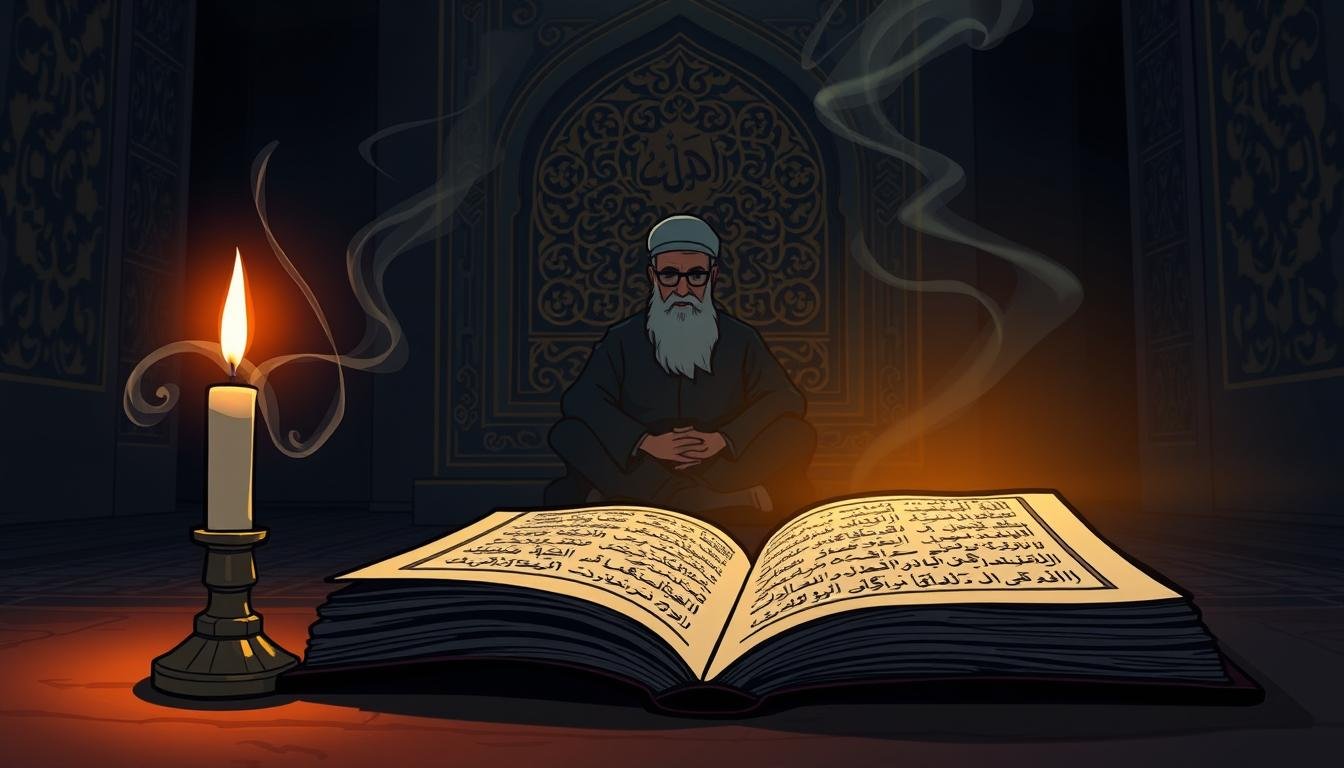Have you ever wondered what makes a religious practice truly Islamic? Growing up, I heard debates about things like Taraweeh prayers and charity apps. Some said they were good, others said they were forbidden.
This debate between old ways and new isn’t new. The Hadith about Bid’ah says, “Whoever introduces something into this affair of ours which does not belong to it, shall have it rejected.” But it’s hard to know where to draw the line between creativity and wrong.
Islamic innovations change how we pray, celebrate, and use tech in worship. Ibn Taymiyyah said, “Every action not legislated by Allah or His Messenger is an innovation.” This isn’t just a theory—it affects our lives every day.
Are charity drives on social media okay? Does adding lights to a mosque go against Sharīʿah? We need clear answers to these questions.
We’ll look closely at this Hadith’s importance. We’ll see how scholars like Ibn Taymiyyah and the Prophet’s companions viewed new religious practices. They allowed things like compiling the Quran’s verses into one book, as long as they were based on Sharīʿah.
The consequences of getting it wrong are serious. Missteps can lead us away from the Prophet’s Sunnah. Let’s seek wisdom, not just rules, to keep our faith strong in a changing world.
Understanding Bid’ah: The Concept of Innovation in Islamic Teachings
The meaning of Bid’ah comes from the Arabic root b-d-ʿ. It means “to originate” or “to create anew.” In Islamic studies, Bid’ah is very important. It talks about new religious practices without a scriptural basis.
The Quran says Allah praises the Prophets for not adding to their messages. “I am not a new thing among the Messengers” (Quran 46:9).
“An innovation must either align with Sharia principles or clash with them—this distinction defines its acceptability.”
So, is a new practice good if it doesn’t go against Quran or Sunnah? This question is at the heart of the types of Bid’ah debate.
Defining Boundaries Through Scholarly Consensus
Traditionally, Bid’ah is divided into two types: good and bad. Good Bid’ah, like collecting Quran verses, is praised. It shows prophetic approval.
Bad Bid’ah, like celebrating prophets’ birthdays, is frowned upon. It lacks scriptural proof.
Historical decisions say changing beliefs is always wrong. But practical innovations can be okay. They can be from not allowed to must-do, based on their effect. This helps keep Islamic teachings flexible for today’s world.
The Famous Hadith About Bid’ah and Its Authenticity
The hadith about bid’ah is key to this talk. It warns us about new things in our faith. The main part says:
“Whoever introduces something into this religion that has no basis, it is rejected.”
This short but strong message shows the Prophet’s point. He wants us to stick to what’s already known. Scholars say it’s true because it’s found in many important books.

This hadith on bid’ah translation shows how serious it is. It’s a key text in many debates. It’s in Sahih al-Bukhari, thanks to Imam al-Bukhari’s careful work.
These texts show the Prophet’s goal to keep Islam pure. He warns us about new things because they can harm us. By looking at these translations, we learn how important clear language is. We start to see how to keep traditions alive while the world changes.
Chain of Narration (Isnad) Analysis
Hadith authentication starts with checking the isnad chain Bid’ah hadith. Over 23 scholars, including Al-Majlisi, found it reliable. They looked closely at each narrator’s trust and memory.
This makes sure teachings like the bid’ah warning match the Prophet’s words. The isnad’s strength is why it’s in big hadith collections on innovations, like Sahih Muslim and Al-Kaafi.
Status of This Hadith in Major Collections
Big Sunni and Shia collections value this hadith. In Sunni tradition, it’s in Sahih Muslim (d. 261H) and Sunan Abu Dawud. Twelver Shi’a cherish it in Al-Kaafi (Al-Kulayni). vol. 2). ch. 159). pg. 375).
These texts, made 200–500 years after the Prophet, use isnad analysis. This separates true from false stories. The hadith’s wide acceptance shows it’s seen as true, despite different views.
Hadith collections focus on sahih stories, based on narrator trust. Al-Majlisi’s work in Mir’aat Al-`Uqool proves its truth. Different words in different sources show the need to check things out.
This mix of tradition and doubt keeps Islamic learning alive. It shows how isnad chains connect past and present debates.
Historical Context: Why the Prophet Muhammad Warned Against Innovations
Understanding why the Prophet Muhammad warned against bid’ah starts with the early Islamic community. He stressed following his teachings to avoid division. His saying, “Every newly-invented thing is bid’ah,” shows his worry about changing core practices.
He saw how other religions strayed from their original teachings. This led him to create strict rules to keep Islam pure.

“Every innovation is misguidance, and every misguidance is in the Fire.”
Early Muslims faced threats from groups like the Khawarij. They introduced teachings that went against the Quran. The Prophet warned against these changes to protect Islamic practice.
The Quran says in 5:3, “This day, I have perfected your religion,” showing Islam is complete. Adding to worship can harm this foundation.
Imam Malik said accepting a “good” innovation means the Prophet’s message was incomplete. But, practices like extended Taraweeh prayers were okay because they had community support. The key is whether they match the Sunnah’s spirit.
The Prophet’s warnings were not just rules. They were practical steps to keep Islam true. Looking at these reasons helps us understand today’s practices better.
Breaking Down the Hadith About Bid’ah: Word by Word Analysis
Exploring the linguistic analysis of bid’ah hadith shows how each Arabic word carries a message. The saying “kullu bid’ah dalalah” (“every innovation is misguidance”) depends on clear meanings. “Muhdathat” means new practices without Prophet Muhammad’s example, as Quran 47:9 shows Muhammad’s mission wasn’t new.
Scholars like Ibn Rajab al-Hanbali say even good additions can lead to misguidance if not based on tradition.
Key Terms and Their Meanings
The word kullu (“every”) is debated: does it mean total ban or something more? The hadith’s structure, with “innama” repeated three times, adds to the urgency. It mirrors Quranic warnings against following desires (Quran 6:116).
The term dalalah means spiritual harm, not just social issues. Ibn Taymiyya says adding 8 stones at Hajj instead of 7 breaks this rule.
“Every innovation is misguidance”—yet Umar ibn al-Khattab praised congregational Tarawih prayers as “the best innovation,” showing different views.
Bid’ah means new laws, not just new actions. The hadith explains: “actions innovated without evidence are rejected,” as Aisha said. This strict check applies to all, making sure we follow divine guidance. By breaking down these terms, we respect the Prophet’s warning and avoid wrong interpretations.
Linguistic Nuances in the Original Arabic
Understanding the Arabic meaning of bid’ah means looking at its roots. Bid’ah means “new matter,” but its religious meaning is heavy. Scholars like al-Shāṭibī say it’s a practice made to look like Sharīʿah, mixing tradition and innovation.
A deeper look at “every bid’ah is misguidance” shows different views. The word “kullu” (every) can mean all or almost all. This leads to debates on whether the Prophet (peace be upon him) meant all innovations or just harmful ones.
Understanding hadith on innovation depends on the context. Early scholars like al-Shafiʿī said innovations against Quran, Sunnah, or consensus are wrong. Others, like Ibn Ḥajar, said some innovations, like writing down Quranic verses, are okay.
This shows a challenge for today’s Muslims: how to keep traditions and move forward? The answer is in the intent and if it fits with divine teachings.
“The core issue is not the innovation itself but its alignment with God’s commands,”
classical jurists explain. Misguidance in Islam happens when innovations change beliefs or practices, like false prophethoods. But, the hadith’s broad statement makes us question: does it really mean all new practices are wrong? Scholars like al-Nawawī divided bid’ah into five types, showing there’s room for change.
As we explore this, we find clarity: Arabic’s depth requires careful thought. A bid’ah’s worth depends on its source, effect, and purpose. This view turns a strict term into a way to think deeply, keeping Islam’s timeless values alive without blocking human creativity.
Different Interpretations Among the Four Major Schools of Thought
Islamic schools have different views on new religious practices. The four madhabs have their own ways of looking at bid’ah. The Hanafi school is known for its detailed approach.
They balance old traditions with changes in society. This helps them understand the Prophet’s teachings in today’s world.
Imam Abu Hanifa made a big difference. He divided innovations into two types: haqiqi and idafi. Haqiqi ones are forbidden because they lack support from the Quran or the Prophet.
Idafi innovations, though, are okay if they follow the Prophet’s teachings. For example, collecting the Quran into one book was seen as a good change.
Later, Al-Kasani and Ibn Abidin added more details. They said there are five kinds of bid’ah: good, okay, neutral, bad, or very bad. They ask if the practice helps Islam.
Practices like Tarawih prayers show the Hanafi school’s flexibility. They allow changes that help people come together. This way, Islam can grow and change in different places.
Now, we face new challenges like digital worship. The Hanafi school’s approach makes us think. How can we keep traditions alive while facing new situations?
The answer is simple: innovations must support Islam’s main teachings. They should not change the core message of Islam.
Maliki Understanding of the Hadith
The Maliki school on innovations focuses on Iḍāfīyyah. This means adding things that change how we do things. Scholars say these changes can lead us astray.
For example, changing prayer times or how we pray is not allowed. Imam Malik wanted to keep things as the Prophet taught. He didn’t like changes that go against the Quran.
Shafi’i Scholars’ Approach to Bid’ah
The Shafi’i view of bid’ah sees some innovations as good. Imam Shafi’i thought it was okay to write down Quranic verses or start schools. He saw these as good for society.
He used the example of Tarawih prayers during Umar’s time. This shows that good for the community can be okay. But, changing prayer ways that go against the Quran is not.
These madhab differences on innovation show different views. Maliki focuses on following the text closely. Shafi’i looks at what’s good for society too.
This shows Islamic law is complex but based on the Prophet’s teachings. Knowing these differences helps us today. It’s about finding a balance between tradition and change.
FAQ
What does Bid’ah mean in Islamic jurisprudence?
Why is the concept of Bid’ah significant for contemporary Muslims?
What is the famous hadith about Bid’ah?
How do scholars determine the authenticity of hadith related to Bid’ah?
What historical context influences the warnings against Bid’ah?
Why is it important to analyze the key terms in the hadith regarding Bid’ah?
How do the four major Sunni legal schools view Bid’ah differently?
What is the Hanafi perspective on religious innovations?
How do Maliki scholars interpret the concept of Bid’ah?
What is the Shafi’i scholars’ approach to Bid’ah?

Embracing Faith, One Insight at a Time!
The teachings of the Quran have always guided my path. With a deep passion for Islamic knowledge, I strive to blend the wisdom of tradition with the relevance of today, making the timeless messages of Islam accessible and meaningful for everyone.
Muslim Culture Hub is my platform to share historical insights and thought-provoking articles, exploring both well-known and lesser-discussed aspects of Islamic culture and beliefs. My mission is to create an inclusive online space where everyone can learn, strengthen their faith, and connect with the profound message of Islam.
Join the journey!
May peace be upon you.








